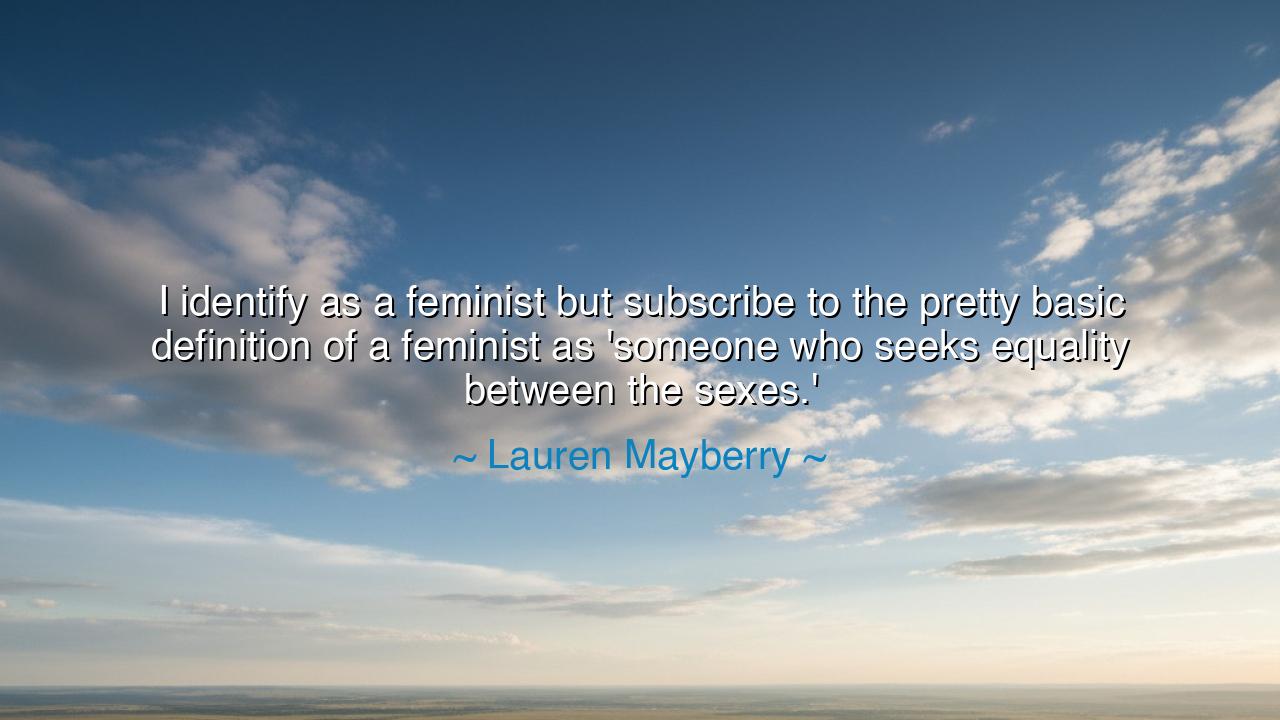
I identify as a feminist but subscribe to the pretty basic
I identify as a feminist but subscribe to the pretty basic definition of a feminist as 'someone who seeks equality between the sexes.'






"I identify as a feminist but subscribe to the pretty basic definition of a feminist as 'someone who seeks equality between the sexes.'" These words from Lauren Mayberry carry within them a powerful simplicity—a call to return to the fundamental principle of feminism that has existed long before it became a political label or a cultural battleground. To identify as a feminist, she suggests, is not to join an extreme or radical faction but to believe in something as natural as justice itself: the desire for equality between men and women. Feminism, at its core, is not an ideology crafted by ideologues but a rational belief that all people, regardless of gender, deserve to be treated with equal respect and opportunity.
This idea of equality between the sexes is not a modern invention. In the ancient world, equality was a concept often understood in theory, but rarely practiced fully. The great thinkers of antiquity, such as Socrates and Aristotle, pondered the nature of justice and equality, but their views were often skewed by the limitations of their time. Aristotle, for example, believed in the natural hierarchy of men and women, with men being intellectually superior and thus more suited to leadership. Yet, even within such limitations, there were voices that called for a more inclusive understanding of justice—one that recognized the inherent worth of all individuals. Lauren Mayberry’s definition of feminism reflects this timeless desire for fairness and equality, one that transcends cultural and historical barriers.
In the history of humanity, it is clear that the fight for equality has always been an ongoing struggle. In the 19th century, Susan B. Anthony and Elizabeth Cady Stanton became pioneers in the fight for women’s suffrage in the United States. They did not fight for special privileges for women, but for equality in the most fundamental of rights—the right to vote. To be a feminist was, for them, to be an advocate for justice, to call for the recognition of women as equal members of society, with the same rights and responsibilities as men. Their fight was not against men, but for the equality of men and women, an equality that would benefit both and create a more just and balanced society. Lauren Mayberry’s belief in the basic definition of feminism is rooted in this same spirit—a commitment to justice without the complications of divisive rhetoric.
Lauren Mayberry’s statement also points to the need to simplify the conversation around feminism. Over time, the term has become laden with political baggage and has often been used to divide rather than unite. But feminism, in its essence, is a call to action for human dignity and respect—a recognition that men and women are both worthy of equality, both deserving of the same rights, opportunities, and protections under the law. It is a rational belief that both men and women, regardless of their physical differences, should be treated as equals, both in public and private spheres. This understanding, as Mayberry suggests, is the basic and uncomplicated essence of feminism that should be embraced by all who seek a just and fair world.
Throughout history, the stories of feminists who have fought for equality have echoed with the same message: equality is not an exception, but a fundamental right. Consider the struggle for women’s education, which has been a key battleground for feminists around the world. Malala Yousafzai, a young girl from Pakistan, became a global symbol of the fight for girls’ education. She stood against a system that denied girls the right to learn, to grow, and to shape their own futures. Her courage in the face of violence and oppression was not a fight against men but a fight for the equality of girls to have the same opportunities as boys. Malala embodies Mayberry’s vision of feminism: a simple belief in equality, a belief that is both rational and necessary for the flourishing of all people.
The lesson of Lauren Mayberry’s words is that equality is a fundamental truth, not a radical belief. We must not allow the word feminism to be hijacked or distorted into something that divides us. Feminism is about justice, respect, and equal opportunities for all—not just for women, but for men, and for people of all backgrounds, races, and genders. When we reduce the conversation to its simplest form, we see that equality is not something that should be feared or politicized, but something that should be embraced by all who seek a fair and just society.
So, future generations, take Lauren Mayberry’s wisdom to heart. Feminism is not a label that divides; it is a call for justice and equality that unites us all. Fight for equality, not because it is trendy or fashionable, but because it is the right thing to do. Embrace the basic and rational belief that all human beings are equal, regardless of their gender, and work every day to build a world where that equality is not just a concept, but a reality. Let us be the voice of change, not through division, but through the power of shared humanity and the unyielding pursuit of justice for all.






AAdministratorAdministrator
Welcome, honored guests. Please leave a comment, we will respond soon